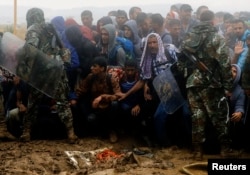Since the start of Syria's civil war more than four years ago, the U.S. has taken in just over 1,400 Syrian refugees — a barely detectable fraction of the four million who have fled the country.
On Thursday, White House officials signaled they were ready to do more: they announced the U.S. would make preparations to take in at least 10,000 Syrian refugees in the upcoming fiscal year.
"The president has directed our team to consider how we can further scale up our response," said White House spokesman Josh Earnest. "And one thing the United States can do is to begin to admit more Syrian refugees."
The U.S. decision comes as the world is bombarded with shocking images of Syrians and migrants from other war-torn countries desperately trying to reach Europe.
The scenes have added to the pressure for the U.S. to ramp up its efforts to help deal with what has become the world's worst refugee crisis since World War II.
UNHCR welcomes US offer
The United Nations refugee agency welcomed Washington's offer Friday, but said it was inadequate given the scale of the exodus of people fleeing war and persecution.
"Of course the United States could and should do much more, but it is a step in the right directions," said William Spindler, spokesman of the U.N. High Commissioner for Refugees during a news briefing in Geneva.
'Drop in the bucket'
Elsewhere, reaction to the announcement was largely negative.
The offer amounts to a "drop in the bucket," according to Eleanor Acer with Human Rights First. "This is not leadership, it is barely a token contribution given the size and scale of the global emergency," she said.
David Miliband, the head of the International Rescue Committee, called the announcement "cold comfort" to victims of the Syrian conflict, saying the U.S. should instead take in at least 65,000 refugees in 2016.
At Human Rights Watch, Executive Director Kenneth Roth, was especially critical of the administration’s effort, calling it a pittance.
“The U.S. is not doing enough,” Ross said. “Even John Kerry’s latest proposal is to increase the annual refugee acceptances from 75-thousand to 100-thousand and all of them wouldn’t necessarily be Syrian. So a net increase of 25-thousand against a Syrian refugee population of four million—that’s a pittance. "
But while Roth was very critical of the U.S. response, he reserved much of his fire for Syria’s neighbors.
“What’s noticeable is that the Arab states of the Persian Gulf haven’t taken any of them even though they are rich, the same culture, the same language. You would think they would open the doors.”
National security concerns
Efforts to host more Syrian refugees have been complicated by fears that the U.S. could also be opening its doors to extremists from the Islamic State and other radical groups.
A proposal earlier this year by Democratic senators to allow 65,000 displaced Syrians to resettle in the U.S. was strongly criticized by many Republicans, with some opponents calling the group of senators the "jihadi caucus."
There is some evidence, however, that such opposition is breaking down, especially amid the relentless stream of dramatic images of refugees.
A bipartisan group of lawmakers attending an event Thursday on Capitol Hill urged the Obama administration to take a bigger role in the refugee crisis.
"The United States has to host more refugees," Congressman Juan Vargas, a Democrat from California, told the U.S.-government funded Alhurra news outlet. "We have the ability to do it, we have the responsibility to do it, so we should do it."
"I think we should allow more refugees in. It's part of what America has always been - that shining beacon on a hill," Congressman Steve Stivers, a Republican from Ohio, told Alhurra.
The lawmakers were speaking at a Washington event organized by In Defense of Christians (IDC), a U.S.-based rights organization.
Longer term answer needed
While the congressmen were united in saying the U.S. should do more, many expressed concerns that hosting refugees was only a temporary solution to the problem.
Brad Sherman, a Democratic congressman from California, said more U.S. weapons were part of the long-term answer.
"We need to be providing real weapons to those in the Middle East that we trust to be supporters of democracy, freedom, and human rights," he said.
VOA's Bernard Shusman contributed to this report from New York. Some material for this report came from Reuters.

